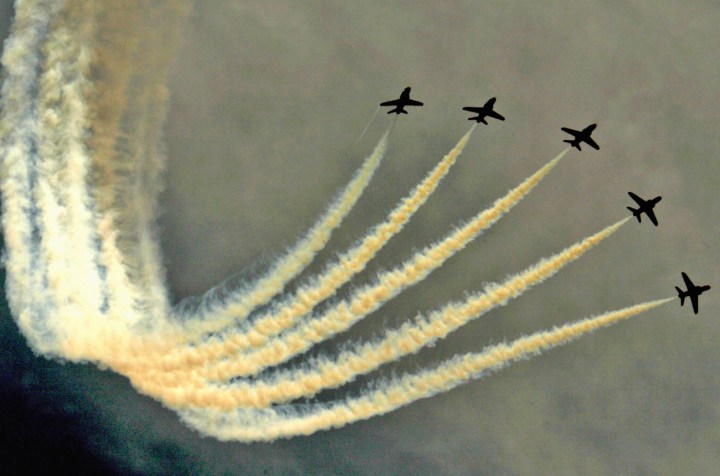Analysis: It is now official, we will never know who benefitted from the arms deal

The payment of a $450 million in penalties to the United States and Britain by BAE Systems, Europe’s largest military contractor, drops the curtain on South Africa’s long-running, tortuous arms deal saga. We will now never know which ANC functionaries got the roughly £100m in bribes which former ANC MP Andrew Feinstein estimates was paid in bribes to senior politicians, officials and political parties.
The investigation by the UK’s Serious Fraud Office was perhaps the last functioning investigation still taking place which might have provided some clues to the glutinous cancer which gradually spread through the ANC as part of what we have come to known as simply “the arms deal”.
Unless some rabbit miraculously pops out of a hat, this is the end. German investigators have long ago given up the ghost. French investigators actually did try in the beginning, but they dropped out early on. The British were the last left standing, and now they too have gone.
It’s lasted close to 15 years; in some ways, it’s a strange relief to know that the whole saga is behind us. The whole event was so sordid, the court processes so lackadaisical, that it simply gradually ground itself down to ash.
Feinstein and co-author Susan Hawley wrote in the Guardian over the weekend that the settlement is a “travesty of justice” and “a slap in the face for the people of the countries BAE has allegedly corrupted”. This is no doubt true, but we have been slapped so many times, it’s hard to feel anything.
Yet, some little oddities are still interesting. For example, the nature of the BAE settlement is so instructive. By far the largest part of the settlement is made not to British, but to American taxpayers, whose prosecutors are more aggressive and less easily manipulated by politicians.
BAE Systems, which is currently taking out ads in the British press to herald its scientific and engineering prowess, said it would plead guilty in London to an accounting violation for “failing to properly record commissions” paid to a marketing consultant involved in its sale of a radar system to Tanzania in 1999. BAE said it would pay about $50 million in Britain in fines and a charitable payment to Tanzania.
“At the time of the deal Tanzania was the world’s third poorest country, but it was persuaded by the UK government and BAE to buy a multimillion-pound radar system it didn’t need. The almost 6 million South Africans with HIV/Aids were told their government couldn’t afford the anti-retroviral medication they needed to stay alive, but could spend billions on unnecessary weapons,” Finestein writes.
Notice the admission is not for bribery as such, which would lay the company open to civil claims, but for an error in record keeping. What could be more absurd?
A lot, as it happens. The US department of justice announced that it was fining BAE $400m for “withholding information about the payment of commissions” in relation to arms contracts. So it’s not actually admitting to paying bribes, just, when asked, not telling authorities about the fact that it has paid bribes.
Like the arms deal itself, it’s all been so transparently obvious yet meticulously shrouded within careful linguistic gobbledy-gook. It was obvious from the start that South Africa did not and does not need jet fighters; yet somehow the proponents managed to convince the SA public and, perhaps, even themselves, that they were crucial part of the SA’s military deterrent. Joe Modise, the then former minister of defence, influenced his own thinking to adopt something he described as a “visionary approach”, i.e. instead of spending a little bit of money and telling a little lie, let’s spend a lot of money and tell a big lie.
And you know what, it worked.
Looking back now, what is the legacy of the “arms deal”, the roughly R50bn in today’s money spent on assortment of corvettes, Hawk training aircraft, Grippen jet fighters, and submarines?
In short, it’s left us all a lot more cynical. South Africans now understandably hark back to those glorious days of innocence twenty years ago when Nelson Mandela walked free. We are all, for better or for worse, a bit older and wiser now.
Our politicians, it turns out, are like their politicians: tripped up by their own fantastic visions of their righteousness. Thabo Mbeki, the orchestrator of the arms deal in South Africa, is now reviled by his own party, and by the country too. Tony Blair, orchestrator of the cover-up in the name of that Orwellian phrase, “British security”, is now also reviled by his own party and by most of his own public.
The UK courts appeared to be just like our courts: compromised, buffeted and bullied by politicians. Remember when Jacob Zuma’s involvement in the arms deal was suddenly dropped just by chance when it became apparent that he would be president, all of it on the oddest and flimsiest of grounds?
But at least the South African courts managed to bring a case, and at least one of the beneficiaries of arms deal corruption, Shabir Shaik, spent some. although diminished, time in jail. When it looked as thought this might happen in Britain in the so called al-Yamamah bribery case that involved a set of Saudi princes, Blair pulled the plug with emphatic force. (Blair, however, let the investigations against other countries, including South Africa, continue. His successor, Gordon Brown, has now remedied that mistake.)
Finestein writes “Richard Alderman, the SFO director brought in after the al-Yamamah debacle, staked his credibility on concluding the BAE case successfully. This settlement shames us all.”
Doesn’t it just.
By Tim Cohen

















 Become an Insider
Become an Insider